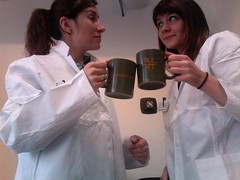Originally posted to my Patreon page, where you can directly support my work!
Anyone who knows me knows I work on a ton of different projects at any given moment. This is why I am often tongue-tied whenever someone asks me what I do or what I've been up to lately. Over time I've come to embrace being scattered and found that my strength is actually in working across an assortment of projects and different industries.I post as much of my work as I can here on Patreon and Twitter, but I realized that it's not always clear what projects of mine have no financial backing other than the support I receive from all of you here on Patreon! So here's a roundup of what "indie" projects I've been working on so far in 2016 and what's on my radar next:
I originally created this site back in 2008 in just two weeks of my spare time immediately following when I left NASA Ames. I've been spending about a day a week, with my friend and collaborator Lisa Ballard (also donating her spare time), working on completely redesigning the site. Coming up on being 8 years old, the site is not only showing its age aesthetically, but it also weighed me down with too much continuous management over the years. Redesigning will not only be a nice refresh, but also will be easier for me to manage moving forward.
I am the global director of Science Hack Day, which is in over 20 countries now. If you don't know about Science Hack Day, check out this video from one of the events. Science Hack Day is essentially about creating what I call "massively multiplayer science" and I firmly believe it is changing the world, even if just a little. I work on managing pretty much everything to do with Science Hack Day year-round. Lots of admin, communication, outreach, and design tasks. I also make myself as available-as-possible for free to people organizing Science Hack Day events around the world, which also means a lot of travel time each year. While I have received small grants and secured global sponsors in the past that have supported small portions of my time in global management, there are no current grants or global sponsors. An important distinction here: the sponsorship money for individual cities (e.g. San Francisco, etc.) goes directly to the event itself.
I have been teaching myself microscopy over the last few months. I got a 20lb. microscope and taught myself how to find tardigrades from my backyard. I also spent a lot of time learning about Rheinberg filters and other techniques I could use for "visually staining" specimens. I began to learn just how much time it takes to manage a microscope (and paid for professional cleaning and servicing when I reached my wits end). I joined the San Francisco Microscopy Society. I co-authored a poster which I presented at the NASA Ames Astrobiology Jamboree to talk about my work thus far with other space science professionals. This all has definitely been a trial in patience - microscopy takes a lot of patience, and I'm certainly not the most patient person. While all this foundational work doesn't yet help anyone but myself, it's all part of a long play of me trying to get a grant to go to Antarctica that I hope will benefit others (both biologists and people interested in learning more about Antarctica).
4. Smaller ongoing projects that I continuously manage
I continue to manage Spaceprob.es, a catalog of the human-made machines that freckle our solar system. Myself & Lisa Ballard launched Spaceprob.es a year ago (after many months of indie work) and continuously make sure to keep it up to date. I also have other ongoing projects like the Future of Science tumblr that I run with Eri Gentry.
5. Starter projects that might be financially supported in the future but aren't right now:
I've been in talks around creating a TV show that I would host and help produce. So far this has mostly resulted in a decent amount of legal fees as I explore the opportunities, but fingers crossed one will pan out. I have also been exploring doing a mini-fashion line with Betabrand (you can help by voting here!).
Finally, here are the indie projects on my radar to try to get to over the next few months:• a project about the history of human spaceflight• a project about multidisciplinary people• returning to doing short, fun, space-tastic YouTube videos.
Thank you so much for all your love and support of my work. And if you haven't yet become a patron of my work, you can do so here. It's not always easy being independent, but you all make it worthwhile.
Ariel





